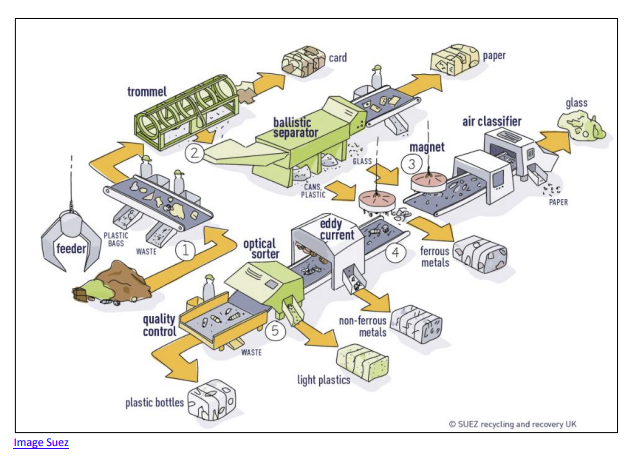Material Recovery Facility: Difference between revisions
Inserting new image |
No edit summary |
||
| Line 4: | Line 4: | ||
There are essentially three broad types of MRF: | There are essentially three broad types of MRF: | ||
*'''"Clean" MRFs''' that accept materials from source separation schemes and [[Dry Mixed Recyclables]] ([[DMR]]). A pictorial overview of their layout is shown below<ref>Suez Recycling and Recovery UK</ref>: | *'''"Clean" MRFs''' that accept materials from source separation schemes and [[Dry Mixed Recyclables]] ([[DMR]]). A pictorial overview of their layout is shown below<ref>Suez Recycling and Recovery UK</ref>: | ||
[[File:Suez MRF drawing.png | [[File:Suez MRF drawing.png|MRF Diagram|link=[[Suez]]]] | ||
*'''"Dirty" MRFs'''/'''Waste to Fuel MRF''' which extract recyclables from mixed [[MSW]] and [[Commercial Waste]] streams and are generally more focused on producing a [[Waste Derived Fuel]] ([[WDF]]). | *'''"Dirty" MRFs'''/'''Waste to Fuel MRF''' which extract recyclables from mixed [[MSW]] and [[Commercial Waste]] streams and are generally more focused on producing a [[Waste Derived Fuel]] ([[WDF]]). | ||
Revision as of 10:02, 19 October 2021
A Material Recovery Facility is often referred to as a ‘MRF’ and is generically a facility that sorts, grades and prepares waste fractions suitable for onward dispatch to Reprocessors. Many also refer to a MRF as a Material Recycling Facility, which is not strictly true in that the MRF separates the material for onward recycling rather than recycling the material in its own right.
There are essentially three broad types of MRF:
- "Clean" MRFs that accept materials from source separation schemes and Dry Mixed Recyclables (DMR). A pictorial overview of their layout is shown below[1]:
- "Dirty" MRFs/Waste to Fuel MRF which extract recyclables from mixed MSW and Commercial Waste streams and are generally more focused on producing a Waste Derived Fuel (WDF).
- Material specific MRFs for example:
- Construction and Demolition Waste and skip wastes
- Waste Electrical and Electronic Equipment
- Plastic materials and purpose designed PRFs (Plastics Recovery Facility or Plastics Recycling Facility)
References
- ↑ Suez Recycling and Recovery UK

